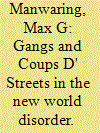|
|
|
Sort Order |
|
|
|
Items / Page
|
|
|
|
|
|
|
| Srl | Item |
| 1 |
ID:
077342


|
|
|
|
|
| Publication |
2006.
|
| Summary/Abstract |
The mutation of protean "street gangs" to insurgents illustrates that insurgents need not be ideologically oriented, and need not be traditional revolutionary fighters emerging from the mountains and jungles to take down or control a government. Rather, they may have their own specific commercial money-making motives, and can emerge out of the favelas, callampas, villas miserias, and pueblas jovenes (city slums) not so much to replace governments as to gain very lucrative freedom of movement and action within a supposedly sovereign national-state. Also, mature second and third generation gangs have been known to act as proxies and mercenaries for traditional nation-states that want to maintain "plausible deniability," and to act as mercenaries for warlords, organized criminal organizations, and/or drug-trafficking cartels that - on certain occasions - need additional "fire-power". The instability and lack of individual and state security generated by gangs phenomenon and their nefarious allies are also known to lead to the radical change of failed state status. In these terms, gangs are no longer a singular law enforcement issue. As crime and war become more and more indistinguishable, gangs must be considered a larger national security issue - that, paradoxically, must be viewed as a local concept
|
|
|
|
|
|
|
|
|
|
|
|
|
|
|
|
| 2 |
ID:
122426


|
|
|
|
|
| Publication |
2013.
|
| Summary/Abstract |
The interview that follows was conducted somewhere in Italy with a militant of the Red Brigades recently freed after spending 32 years and 6 months in prison. Taking up the sociological perspective of Max Weber, the author draws a distinction between "professional terrorist" and "vocational terrorist". The terrorist by vocation differs from the professional terrorist in his profound faith in the mission he feels he must accomplish. He does not try to improve his social status and is not interested in the selfish pursuit of personal well-being. He gives up love, family, children and friendship. When he decides to join a terrorist group, he voluntarily severs any contact with his former life. He is a high school or university graduate and might choose a secure life and a good job but prefers to kill, accepting the risk of dying. The vocational terrorist is the terrorist in his incandescent state.
|
|
|
|
|
|
|
|
|
|
|
|
|
|
|
|
| 3 |
ID:
174213


|
|
|
|
|
| Summary/Abstract |
This article examines alleged Czechoslovak assistance to the Italian extreme-left terrorist organisation, the Red Brigades, and how the case has been investigated in Czechoslovakia and the Czech Republic. The authors present the sources of information on the issue and analyse the course of the investigation undertaken by the Office for the Documentation and Investigation of the Crimes of Communism. In the absence of a complete archival record, given that important documents were shredded, the full truth about the fact and nature of any Czechoslovak assistance may never be known. Yet there are some grounds for speculation that assistance was granted by elements within the Czechoslovak secret services, and that these elements failed to inform the Communist Party leadership about their actions. However, it is not possible to confirm this on the basis of available documents.
|
|
|
|
|
|
|
|
|
|
|
|
|
|
|
|
| 4 |
ID:
172179


|
|
|
|
|
| Summary/Abstract |
The article analyzes the language, the propaganda, and communication techniques used by the Red Brigades (BR) during their activities. The analysis is based on the study of 181 communiqués, written and circulated by the terrorist organization between 1970 and 1988, i.e., from the beginning to the end of its activities. The corpus comprises three types of communiqués: a) claims of responsibility for violent actions (kidnapping, homicides), b) internal documents aimed at creating a coherent organization and ideology, and c) texts that circulated within the extra-parliamentary Left to generate positive propaganda towards the BR. The paper demonstrates that the language used, as well as the propaganda techniques, underwent important changes during the period of activity of the BR, in accordance with the evolution of their objectives and their internal development. In addition to this, the analysis reveals a certain repetition of specific communication strategies, as well as identification of specific contents that show a certain degree of homogeneity. At the same time, the article also assesses the structural changes that took place within the BR, which may have affected their communiqués.
|
|
|
|
|
|
|
|
|
|
|
|
|
|
|
|
|
|
|
|
|